Building trust free apps in a hostile world
Me
- Michael Shaw
- 50% of Cosmic Teapot
- 7 years of Scala
- Scala, Rust, Swift
Problem
Shipping Files
Shipping Events
Real World (tm)
Reflection
I'm an app developer
Apps need to synchronize data
I don't want to admin servers
I care about user privacy
Problem
Machines sharing a single dataset
Always writable, not always online
Adding a device needs to be fast for 50-300k rows
Cross-platform would be nice

Maybe one "nines"


Mobile devices go places
or they're just off
or out of credit
or using Telstra
We'll have to settle for
strong eventual consistency

and be Available under a Partition (see CAP theorem)
Let me tell you a story
You're a practical developer
You build as little and as fast as possible

You pick a Backend As A Service




Represent your local rows 1-1 in your remote store

Cry when you instantly run out of quota

They're batching your writes, but charging your quota with 1 request per row
Treating initial synchronization like it's a DDOS attack
Cry about how bad their APIs are
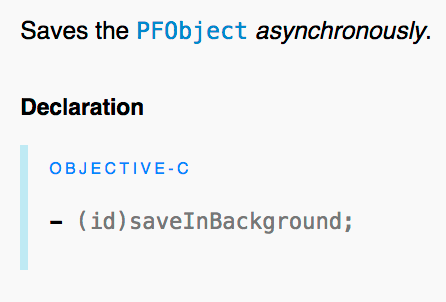

Cry when they shut down

Realize you don't have to use them anymore

Go outside and rethink your life choices

Starting over
Batching
1 Local row : 1 Remote row won't work
- Record changes and batch in files
(essential state) - Ship files around
- Apply changes to a local database
(derived state)

Congratulate yourself
on inventing log shipping

Event Sourcing
if you're a consultant

Shipping Files
Simple Distributed File Store
case class File(
name:UUID,
clientId:UUID,
localCreatedAt:LocalTime,
data:Array[Byte]
)
case class FileUploaded(name:UUID, serverCreatedAt:ServerTime)
trait FileServer {
def getSince(time:ServerTime, n:Int) : [File]
def put(file:File) : FileUploaded
def delete(name:UUID) : Unit // Chekhov's delete- Upload local files that aren't on the server
- Save a FileUploaded record when you upload/download a file
- Download new files in ServerTime ascending order for an easier delta
Property test for convergence
property("clients converge") = forAll {
(client:List[Client]) =>
val timeAllowed = 5.seconds
val server = new FileServer()
def clientsConverged : Bool = {
clients.zip(clients.drop(1)).forall((l,r) => l.files == r.files)
}
while (timeElapsed() < timeAllowed && !clientsConverged) {
for (client <- clients) {
for {
file <- client.unuploadedFiles.headOption
} {
client.upload(file, server)
}
client.downloadNewFilesFrom(server)
}
}
clientsConverged
}Improving our tests
- Run clients in seperate threads with seperate
server resources - Add configurable simulated error rates + latency
- Test against remote backends
What do we have?
An eventually consistent distributed file store
All living clients will eventually agree upon a set of files
This forms our bedrock layer of synchronization
Only create and delete (no update)
What are we missing?
The ability to do anything but share binary files
We can't even update our binary files
Shipping Events

Events
case class Person(name:String, age:Int)
case class Event[T](
id:UUID,
localCreatedAt: LocalTime,
row:T,
removed:Bool
)"removed" denotes deletion, a tombstone
Serialize these in to our files
App Structure
Thanks to our distributed file store we now have an eventually consistent event set :)
That don't arrive in a uniform order across clients :(
Derived State Machine
val peopleTable : Map[UUID, Event[Person]]We apply rows to our state machine as we get them
def apply(db:Map[UUID, Event[Person]],
event:Event[Person]) : Map[UUID,Event[Person]]If we're working locally, intuitively we just replace the old event the new one
But what about events from other clients?
Which #123 do we keep?
Resolution
Always replace the existing one? Clients diverge
We need a merge function
def merge(a:Event[Person], b:Event[Person]) : Event[Person]
Merge must allow
- Reordering of events (commutivity)
x • y = y • x - Different batching/grouping (associativity)
( x • y ) • z = x • ( y • z ) - Duplicate events (idempotence)
x • x • x = x
All clients must run identical merge functions on local and remote events alike to guarantee convergence.
Binary Functions
Not + - / * or `concat` as they're not idempotent
- Max
max(3, max(1, 2)) == max(1, max(1,max(2,3)))
- Set Addition
Set(1,2) ++ Set(1,3) == Set(3) ++ Set(1,2) ++ Set(2,3)
Last Writer Wins
Max applied to events
Establish a Total Ordering amongst events

Driven by some form of local time as we must allow immediate writes
case class Event[T](
id:String,
localCreatedAt: Event.LocalTime,
row:T,
removed:Boolean
)
implicit val personOrdering : Ordering[Person] = Ordering.by { person =>
(person.name, person.age)
}
val localTimeOnlyOrdering:Ordering[Event[Person]] = Ordering.by { ev =>
(ev.id, ev.localCreatedAt, ev.row)
}Using Our Total Ordering
type MergeEvent[T] = (Event[T], Event[T]) => Event[T]
def merge[T](ordering: Ordering[Event[T]]) : MergeF[T] = {
{ (a: Event[T], b:Event[T]) =>
if (ordering.gt(a,b)) a else b
}
}
def sample() {
val mergeF : MergeEvent[Person] = merge(localTimeOnlyOrdering)
val ev = mergeF(
Event("123", 12, Person("steve", 25), false),
Event("123", 14, Person("steve", 26), false)
)
}
// Event(123,14,Person(steve,26),false)Extending merge to maps
type EventMap[T] = Map[String, Event[T]]
type MergeMap[T] = (EventMap[T], EventMap[T]) => EventMap[T]
def mergeMap[T](me:MergeEvent[T]) : MergeMap[T] = {
{ (a: EventMap[T], b:EventMap[T]) =>
a ++ b.map { case (bk,bv) =>
bk -> a.get(bk).map(av => me(av, bv)).getOrElse(bv)
}
}
}
def sampleMap() {
val mergeMapF = mergeMap(merge(localTimeOnlyOrdering))
val a = Map(
"123" -> Event("123", 12, Person("steve", 25), false),
"456" -> Event("456", 13, Person("eve", 27), false)
)
val b = Map("123" -> Event("123", 14, Person("steve", 26), false))
val db = mergeMapF(a, b)
}
// Map(
// 123 -> Event(123,14,Person(steve,26),false),
// 456 -> Event(456,13,Person(eve,27),false)
// )Revisiting Conflicts
Testing Merge functions
property("merge function converges") = forAll {
(events:List[Event[Person]], seed:Int) =>
val permutations = 12
// permutations of a list of batches
val permutatedEventBatches = for(i <- 0 until permutations) yield {
val withDupes = dupe(events, seed) // idempotence
val reordered = shuffle(events, seed) // commutativity
inRandomBatches(reordered, seed) // associativity
}
val results = permutatedEventBatches.map { batches =>
batches.foldLeft(Map.empty) { (accu, e) merge(accu, e)}
}
allEqual(results)
}Congratulations, you've invented CRDTs
Conflict-free Replicated Data Types
Merge functions and data model choices drastically affect system behaviour
We're looking at a small subset, just enough to represent a "traditional" independent row based system
CRDTs: Consistency without concurrency controlShip It?
Last Writer Wins on local time is very limiting
The described system is only moderately useful

Real World (tm)

Latency & Performance

Users expect changes to go out instantly to other clients
This involves creating & uploading a new file
100 items a day * 2 years = 73k rows = 73k files
Downloading batches of 200 files at 1 fetch per 2 seconds = 12 minute sync
Almost reasonable for a desktop app
Death for a mobile app
Compaction
We can merge files to reduce the file count
We're allowed to do this since our merge function allows arbitrary grouping (associativity)
The server can compact these rows

Merge, but for files
Wait
I like to sleep at night
I don't want to run more servers
Client side compaction
Clients have the entire data set
We need to keep our file count low enough to facilitate a fast initial sync when adding a client
- Always compact unuploaded files before uploading
- Compact files only when threshold reached
Generational Compaction
New files given generation 0
Compacted files are given generation:
max(generation of superseded files) + 1
Sort files by generation, take 50th percentile (50-80 is fine)
Compact all files of that generation and lower

Post compaction
The new file is given a new id and will be uploaded
It contains a record of superseded files
We can then safely delete superseded files locally and remotely
Upper Threshold
Max Files Allowed = (Max allowed sync time)
/ (Time per request)
* (Files per request)
Accidental Simultaneous Compaction
Duplicates are fine, our merge function is idempotent
Duplication becomes a performance optimization, not a correctness issue
Can be made extremely rare

Dynamic Threshold
Sort recently seen client ids, evenly space on continuum

Download before upload so we know what clients are around
A client's location is it's threshold
Time Revisited

Local Time Sucks
"Local" Lamport Clocks
- Increment "time" before any event
- Include "time" in any uploaded file
- When downloading a file, set "time" to max(our_time, message_time)
Total Ordering (even where it doesn't exist)
Monitonically increasing
Locally, new rows > old rows
Offline clients
"Time" counter increments fastest on clients doing the most writes
This can have fairness drawbacks
Instead, when setting time, set it to:
max(desired_value, current_local_time())
Monitonically increasing "local time"
Server Time
case class Event[T](
id:UUID,
localCreatedAt: LocalTime,
serverCreatedAt: Option[ServerTime],
row:T,
removed:Bool
)Neutral, fairer observer between clients
Server Time Alone Sucks
How do we apply local rows before we know the server time?
Apply twice
1. Initially with local time only
2. After upload, reapply it again, with server time
Min Server Time
case class Event[T](
id:UUID,
localCreatedAt: LocalTime,
minServerCreatedAt: ServerTime,
row:T,
removed:Bool
)Set to max local minServerCreatedAt observed
Allows unuploaded rows to win the local merge
After upload set:
event.minServerCreatedAt = max(
file.serverCreatedAt,
event.minServerCreatedAt
)Forcing server monotonicity
Best of both worlds?
Compute a derived boolean 'lost' based on if server time is much later than local time
Order these 'lost' events very low
def lost[T](event:Event[T]) : Boolean = {
event.minServerCreatedAt > event.localCreatedAt + lostPeriod
}
val lostOrdering : Ordering[Event[Person]] = Ordering.by { ev =>
(ev.id, !lost(ev), ev.minServerCreatedAt, ev.localCreatedAt, ev.row)
}Careful! A local only row can never beat the same row after being uploaded to the server
This function would cause divergence
Testing merge functions for convergence is easy
Reproducing real world experiences is hard

Merge has tunnel vision
Only works within a single id, what about:
- Foreign keys
- Uniqueness constraints
A given set of events must be merged deterministically

Nobody said you couldn't generate more events in response though
Outside of our safe borders
- Protecting deleted parents in an FK relationship through restamping the parent if a remote client deletes it
- Prompting the user to help resolve uniqueness constraints (or take newer)
- Writing superseded rows off to the "side" and allow the user to revive/restamp them
Use at your own peril
Never violate the laws of your merge function
Aim simple & test thoroughly
Outside of mobile
CRDTs are well suited to collaboration on human readable things
Like shared documents
What do we have?

+ Minimalist file server
(New BAAS client in a few days of work)
What was the title of the talk again?
"Trust free computing in a hostile world"
Files, Files, Files

gzip

Client Side Encryption
Privacy
We don't trust HTTP transport
Why would you trust storage?
You can't lose/leak what you can't understand

The server component remains a replaceable + ignorant component in your architecture
Sleeping developers, happy users
Thanks for listening